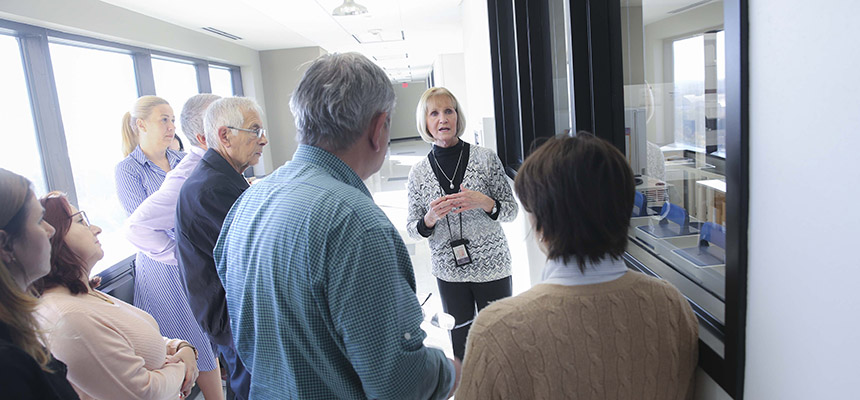Balkans group visits UNTCHI
By Jan Jarvis
Someone in the group wanted to know why everyone behind the glass in the forensics lab was wearing earmuffs.
“When you’re pulverizing bones into a powder it creates a loud noise,” said Linda LaRose, Research Assistant Director, UNT Center for Human Identification. “We want to protect their hearing.”
The visitors, all from the western Balkan region of eastern Europe, were at UNT Health Science Center to learn more about how missing person cases are handled in the United States.
Members of the group are from Bosnia and Herzegovina, Croatia, Kosovo and Serbia, and are spending three weeks meeting with law enforcement, touring institutions and visiting several U.S. cities. The U.S. Department of State Bureau of Educational and Cultural Affairs, the International Visitor Leadership Program, Meridian International Center and the World Affairs Council of Dallas arranged the program.
Over the two days they spent at UNTHSC, the group learned about processes ranging from the information collected in databases to the psychosocial assistance that is provided for families of missing persons.
During the 1990s, a series of wars occurred in former Yugoslavia, ending with the conflict in Kosovo, the last armed confrontation in the Balkans.
All of the visitors work for programs focused on finding and identifying remains, mostly from these wars. But their mission also extends as far back as World War II.
By the end of the conflict in the Balkans, there were 40,000 missing persons, said Samira Krehic, Deputy Head of the Western Balkans Program of the International Commission on Missing Persons.
“We have managed to identify over two-thirds of them,” she said. “But we still have around 11,000 that are still missing.”
Identifying those who are still missing remains a challenging but rewarding task.
“At the end of the day, this is very much about creating an historical narrative that is based on facts and not mythology,” she said.
Crime knows no boundaries. It reaches into all aspects of daily lives – rapes, murders, burglaries, extortion, human trafficking, terrorism, computer/digital crimes, and the list goes on, said Bruce Budowle, PhD, Director of the UNTCHI. There is also the demands for identifying missing person from mass disasters.
“These terrible acts and tragedies continue to plague us; we must work together internationally to continue to find better ways to combat crime for a better way of life and identify victims to bring some resolution to families,” he said. “The task is huge and daunting. However, by exchanging and collaborating with our colleagues worldwide, there is hope that we all can meet the challenge.”
By visiting UNTHSC, the Balkans group hoped to gain insight into how DNA helps solve complex missing person cases and crimes. During a presentation, LaRose explained how the UNT Center for Human Identification identified the remains of two of the victims of serial killer John Wayne Gacy. She also explained the role the program has played in identifying the remains of boys from a former reform school in Florida.
The group members said they were impressed with what they observed.
“It is interesting to learn a different system and see which practices and technology are being used,” Krehic said. “I’m happy to say we are not lagging behind.”







Social media